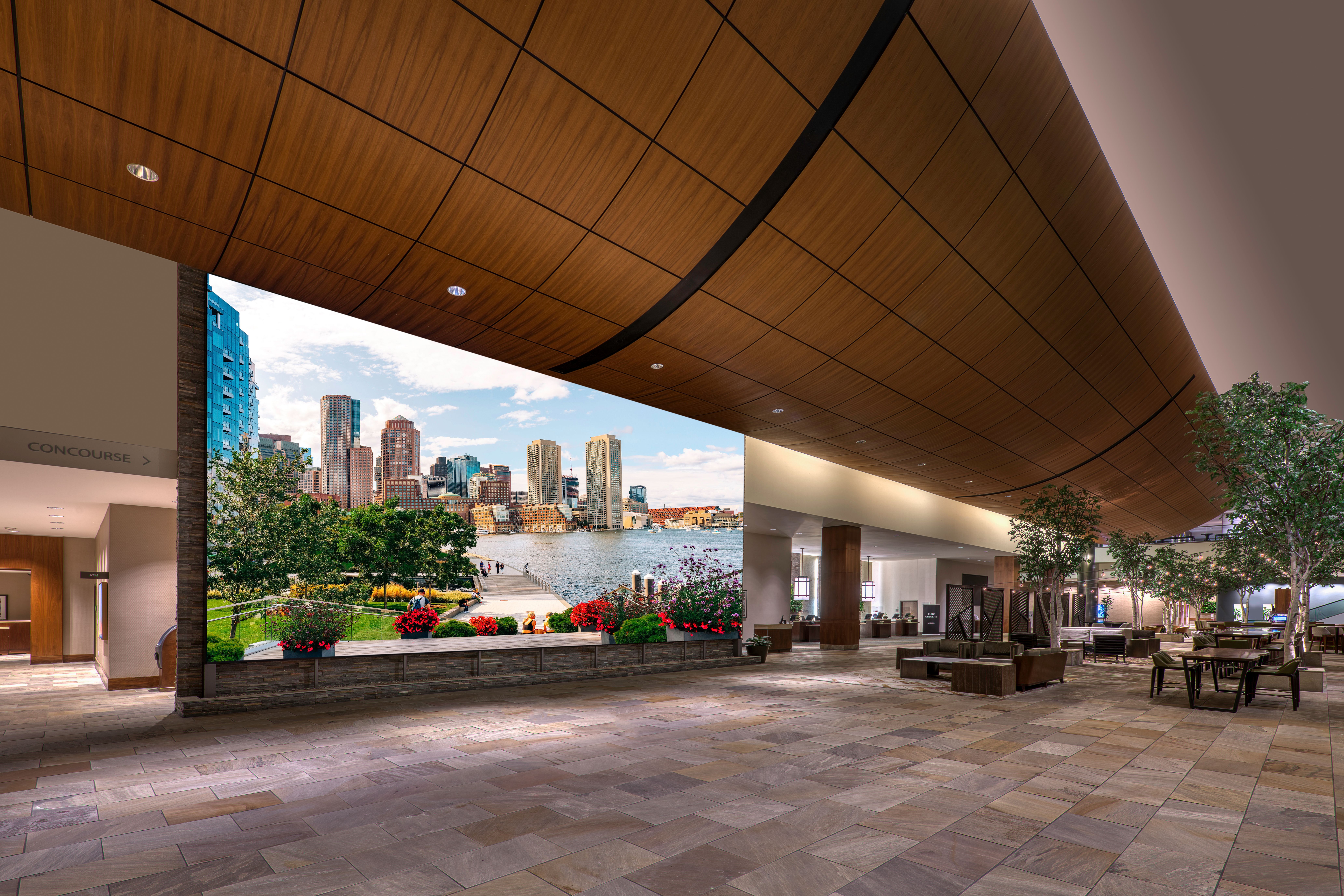 SM24 Highlights
SM24 Highlights
Statistics
Attendees: 1007
Exhibitors: 16
Workshops: 26
Commercial Workshops: 5
Sessions: 206
Posters: 185
Program Committee Chair: Gabriel C. Spalding
Meeting Planning Committee: Debbie Andres, Brad Conrad, Anne Cox, Dan Crowe, Jonathan Perry, Gordon Ramsey, Ex Officio, Tiffany Hayes, and Mas Tadesse
Special thanks to Susan Kelley and Sean P. Robinson for the outstaning support in organizing this meeting.
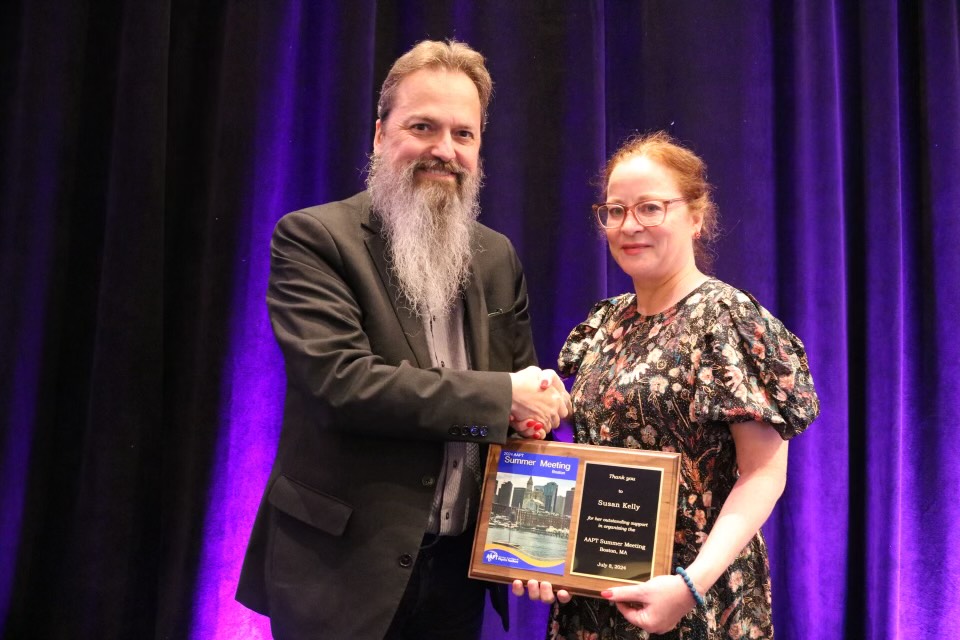
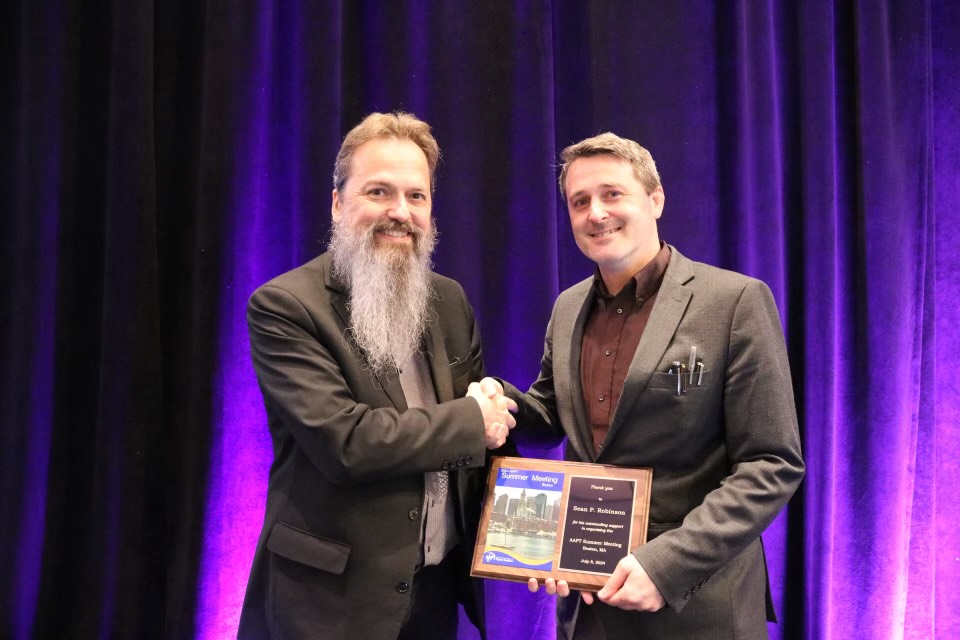
One of the most historic cities in the United States, Boston, MA boasts an impressive array of landmarks, parks, amenities and other points of interest. The meeting was held at the Westin Boston Waterfront Seaport District ideally located along the Waterfront. A vibrant neighborhood in an iconic city, the Seaport District offers rich history, world-famous attractions, and hidden gems for those who want to take the path less traveled. It was close to family-friendly fun at Boston Children's Museum, stunning exhibits at the Institute of Contemporary Art, and much more.
The city welcomed physics educators as AAPT gathered to collaborate and share research. The Museum Of Science and the AAPT-New England Section welcomed a national gathering of the American Association of Physics Teachers on Friday July 5th, 5 PM to 8 PM. The Museum of Science generously opened their exhibit area so that meeting attendees could enjoy an evening of exploration and discovery.
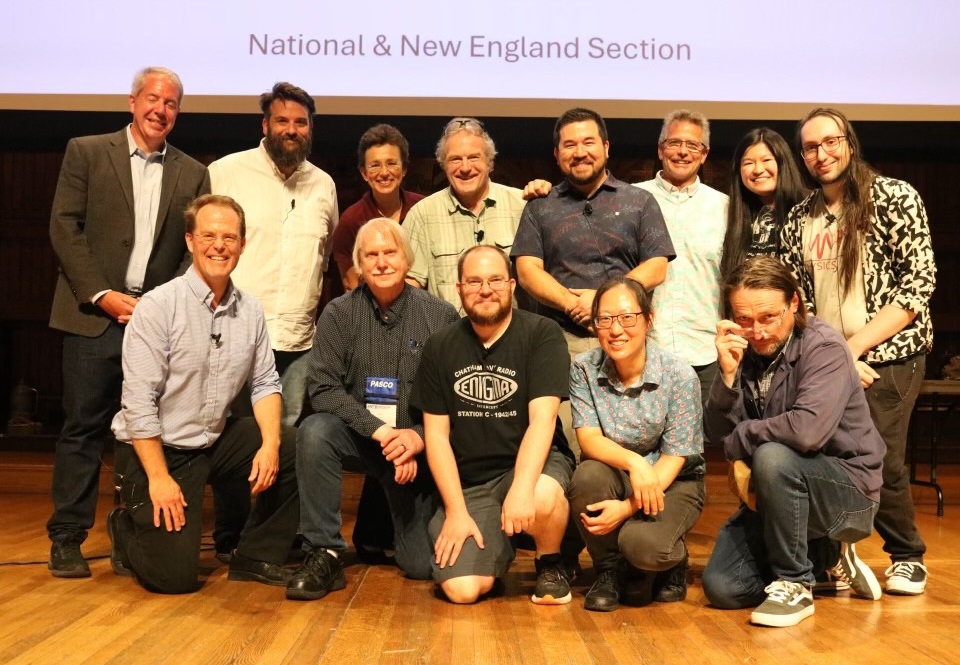
The New England Section of AAPT and the Harvard Center for Astrophysics welcomed meeting attendees to an enriching evening, the Center generously opened its doors so that meeting attendees could unlock the wonders of the cosmos through rooftop stargazing, guided tours of the iconic Great Refractor and gain insight into innovative learning resources. They delved into the captivating history preserved within the Harvard Plate Stacks and archival materials, with a dedicated spotlight on the influential women astronomers of Harvard since the mid-1800s. Attendees met educators and researchers from the Science Education Department, and explored new innovative physics teaching and learning resources being developed by the Center.
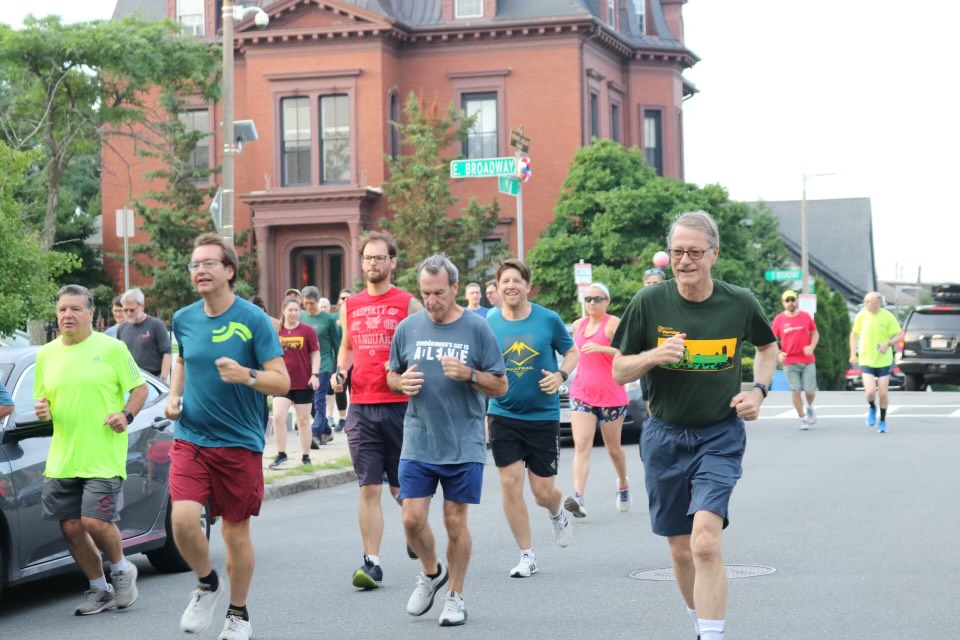
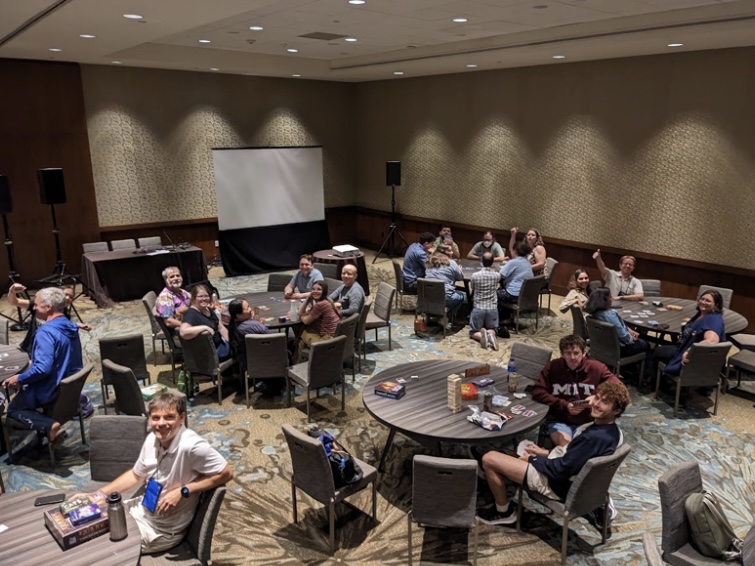
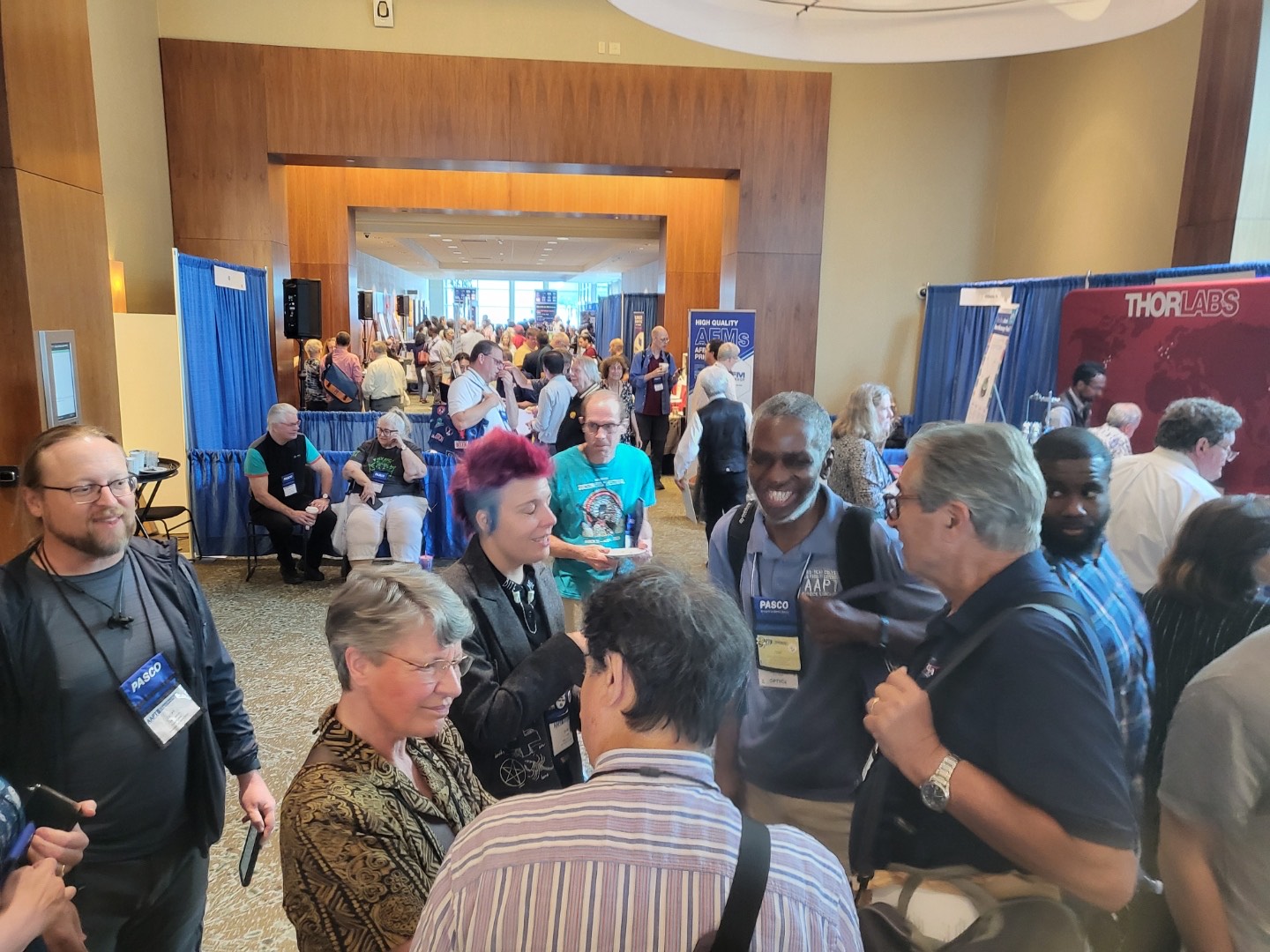
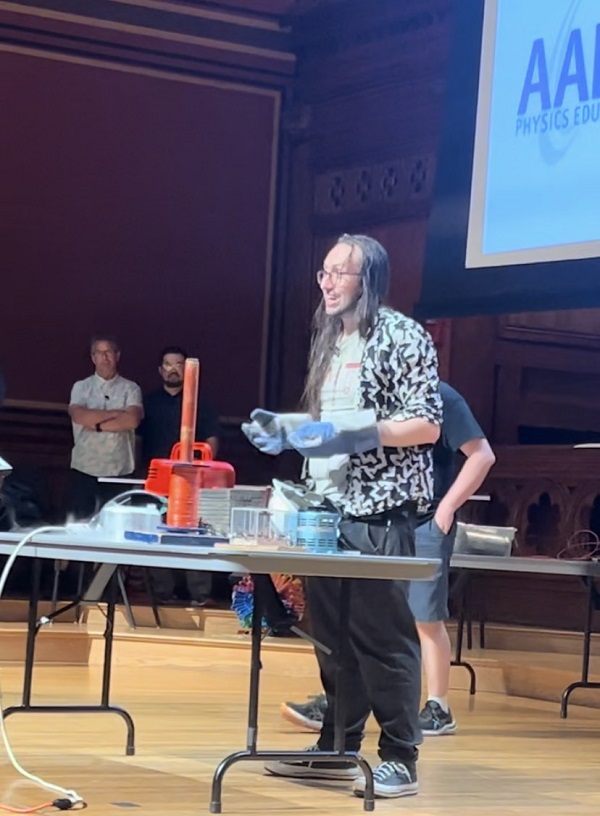
Much anticipated features of the Summer Meeting, The AAPT Fun Run/Walk, The High School Physics Photo Contest, Demo Show, Game Night, Speed Networking, Safe Solar Observing Share-A-Thon, First Timers Gathering, and the Two-Year College Meetup, are always highlights and this year they were exceptional.
Awards
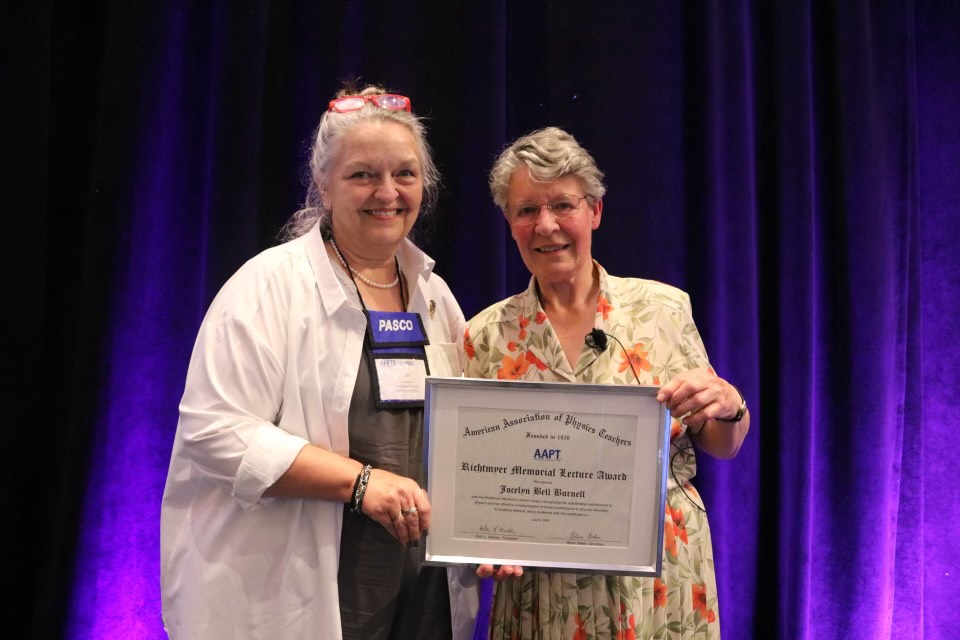 Jocelyn Bell Brunell received the 2024 Richtmyer Memorial Lecture Award. Her talk was, Bursts, bangs and things that go bump in the night. With larger and better telescopes and detectors operating at many wavelengths astronomers have been able to shorten integration/exposure times leading to the discovery of a wealth of short-duration events which she described.
Jocelyn Bell Brunell received the 2024 Richtmyer Memorial Lecture Award. Her talk was, Bursts, bangs and things that go bump in the night. With larger and better telescopes and detectors operating at many wavelengths astronomers have been able to shorten integration/exposure times leading to the discovery of a wealth of short-duration events which she described.
Bell Burnell inadvertently discovered pulsars as a graduate student in radio astronomy in Cambridge, opening up a new branch of astrophysics—work recognized by the award of a Nobel Prize to her supervisor. She has subsequently worked in many roles in many branches of astronomy, working part-time while raising a family. She is now a Visiting Academic in Oxford. She has been President of the UK’s Royal Astronomical Society, in 2008 became the first female President of the Institute of Physics for the UK and Ireland, and in 2014 the first female President of the Royal Society of Edinburgh. She was one of the small group of women scientists that set up the Athena SWAN scheme. She has co-edited an anthology of poetry with an astronomical theme – ‘Dark Matter; Poems of Space’.
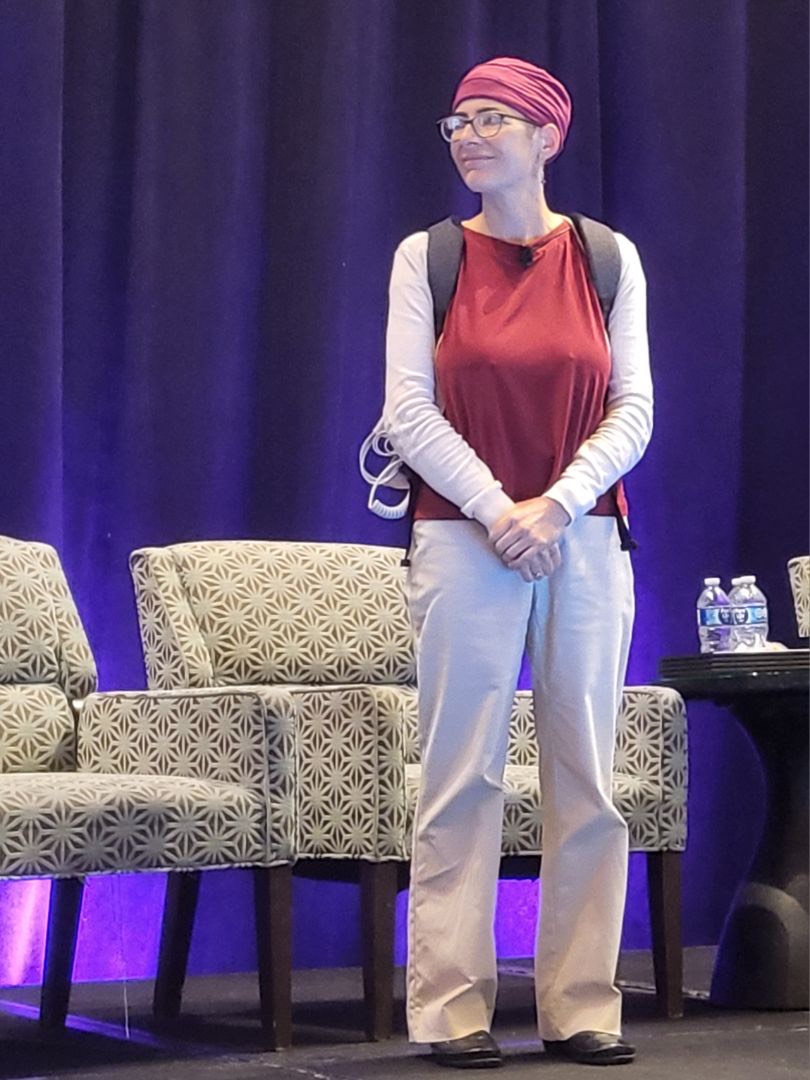 The 2024 Lillian McDermott Medal was awarded to Stephanie Chasteen. In her talk, “My life pursuing excellence in physics education,” Chasteen shared some ideas that have guided her throughout her life – enabling her impacts on physics education. From her experiences in journalism, radio, museum work, course design, physics education research, and finally program assessment, she has amassed several life lessons. Ultimately, she argued that we should pursue excellence in our work because it matters to others, and to you.
The 2024 Lillian McDermott Medal was awarded to Stephanie Chasteen. In her talk, “My life pursuing excellence in physics education,” Chasteen shared some ideas that have guided her throughout her life – enabling her impacts on physics education. From her experiences in journalism, radio, museum work, course design, physics education research, and finally program assessment, she has amassed several life lessons. Ultimately, she argued that we should pursue excellence in our work because it matters to others, and to you.
Chasteen has made extraordinary contributions to physics education, having served as a consultant on over 50 STEM education projects, helping departments and faculty take up new practices that embrace educational innovations. Although many of her contributions have been as an external evaluator, she has also contributed significantly to educational workshop design and translating research to teaching practice in numerous settings. Chasteen is passionate about the power of external evaluation to have meaningful impacts on the world. As an external evaluator, Chasteen worked behind the scenes to help project leaders enhance the impact of national-scale efforts such as the Physics and Astronomy New Faculty Workshop (NFW), Physics Teacher Education Coalition (PhysTEC), Get the Facts Out (GFO), and Effective Practices for Physics Programs (EP3) – as well as dozens of smaller projects. Her broad background and keen eye led her to make significant intellectual contributions to these projects along with concrete suggestions of how they can improve. Through external evaluation, she has brought a steady and powerful passion that has steered projects to higher impact and increased accountability within the projects themselves and to their sponsors.
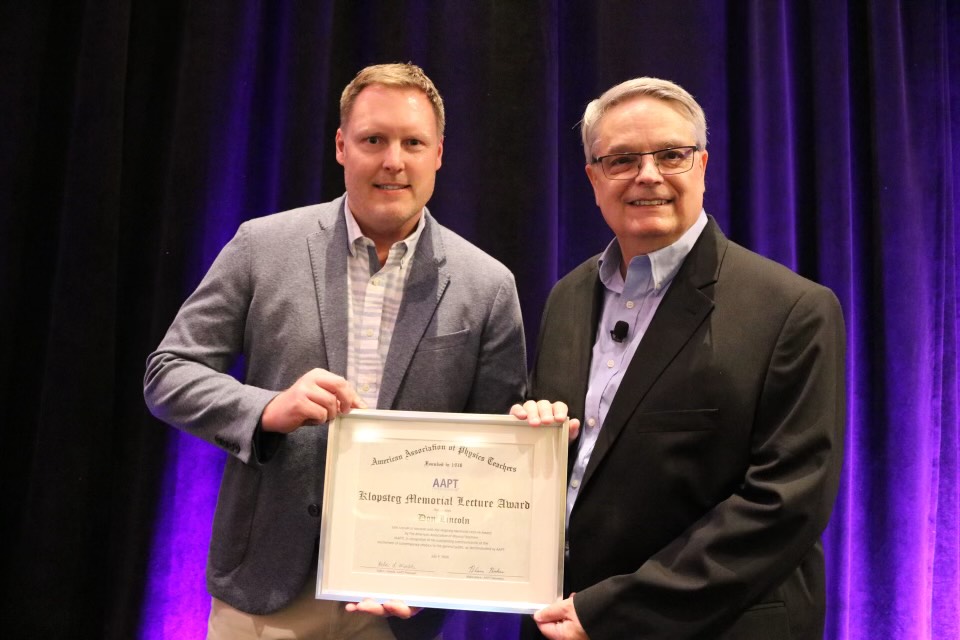 Don Lincoln received the 2024 Klopsteg Memorial Lecture Award. For millennia, philosophers and theologians have pondered the ultimate nature of reality. While these early efforts paved the way, real progress in this area began with the development of the scientific method. Over the past century, physicists interested in the fundamental nature of matter, energy, space, and time have learned a a great deal about the laws that govern the physical world. In his talk, What Keeps Me Up At Night: Unanswered questions in fundamental physics, Lincoln noted that the Vast clusters of galaxies and tiny quarks and leptons have begun to yield some of their secrets. However, the job is not done and not all questions have been answered. He introduced some of the big unanswered questions of particle physics and cosmology and describe some of the ways in which researchers are trying to answer them.
Don Lincoln received the 2024 Klopsteg Memorial Lecture Award. For millennia, philosophers and theologians have pondered the ultimate nature of reality. While these early efforts paved the way, real progress in this area began with the development of the scientific method. Over the past century, physicists interested in the fundamental nature of matter, energy, space, and time have learned a a great deal about the laws that govern the physical world. In his talk, What Keeps Me Up At Night: Unanswered questions in fundamental physics, Lincoln noted that the Vast clusters of galaxies and tiny quarks and leptons have begun to yield some of their secrets. However, the job is not done and not all questions have been answered. He introduced some of the big unanswered questions of particle physics and cosmology and describe some of the ways in which researchers are trying to answer them.
Don Lincoln, a staff scientist at Fermi National Accelerator Laboratory, is prolific as a science writer, producer of video content for the general public, productive public speaker, and a strong supporter of educational content for teachers.
A passionate popularizer of physics and astronomy Lincoln has penned several books for the public and students alike including Einstein’s Unfinished Dream: Practical Progress Towards a Theory of Everything (2023), Understanding the Universe: From Quarks to the Cosmos (2004), The Quantum Frontier: The Large Hadron Collider (2009), and Alien Universe (2013). Having a far reach in his communications to the general public, he has written for The Physics Teacher, Scientific American, NOVA, LiveScience, BigThink, and CNN. While his magazine articles are a potent influence and vehicle for communicating contemporary physics, perhaps Lincoln’s most visible efforts are seen through his remarkable video presence. He is the presenter in over 150 YouTube videos for Fermilab’s YouTube channel, with over 770,000 subscribers and 74,000,000 views. One of his most viewed episodes is “What is a Higgs Boson?” which is perhaps not so surprising since he was part of the team that is credited with the discovery of this fundamental particle. He has also produced several video physics courses for The Great Courses/Wondrium company, each 12 hours of content on modern physics topics.
Also notable are his extensive public lecture appearances, which include several TED talks, and more recently, high profile presentations for New Scientist (“Fermilab: solving the mysteries of matter and energy, space and time”) and the Chicago Comic and Entertainment Expo (C2E2, “The Science of Star Trek”). His popularity can be seen with his frequent collaborations with local science clubs Society of Physics Students (SPS) regional student meetings, and his video content. His videos have been watched millions of times and are shown in undergraduate classrooms around the world.
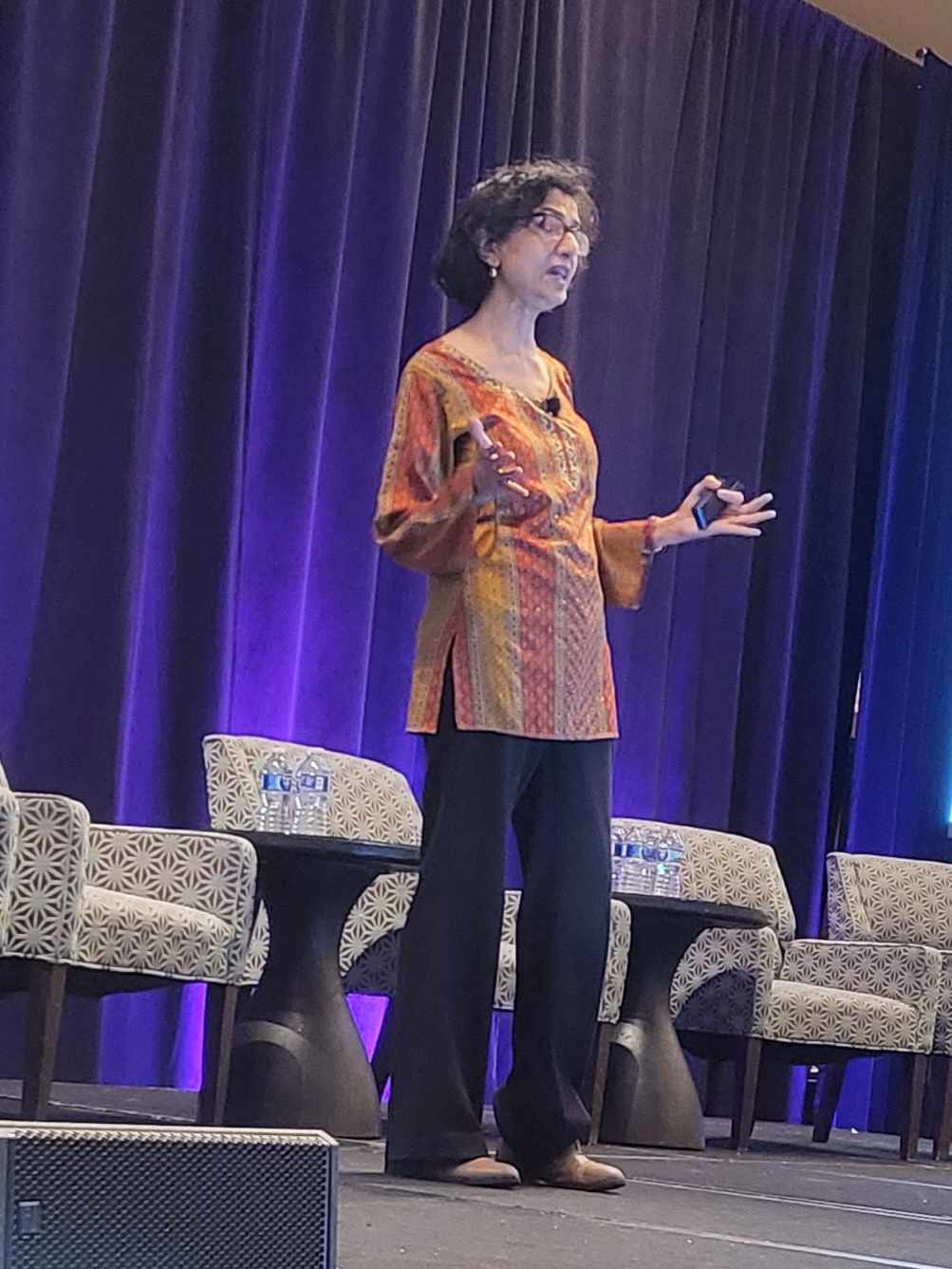 The John David Jackson Excellence in Graduate Physics Education Award for 2024 will be awarded to Chandralekha Singh, Distinguished Professor of Physics, University of Pittsburgh, Pittsburgh, PA. Singh earned her B.S. and M.S. in Physics at the Indian Institute of Technology, Kharagpur and her M.A. and Ph.D. in Physics at the University of California, Santa Barbara.
The John David Jackson Excellence in Graduate Physics Education Award for 2024 will be awarded to Chandralekha Singh, Distinguished Professor of Physics, University of Pittsburgh, Pittsburgh, PA. Singh earned her B.S. and M.S. in Physics at the Indian Institute of Technology, Kharagpur and her M.A. and Ph.D. in Physics at the University of California, Santa Barbara.
Physics graduate education for the 21st Century Physics graduate education is a critical phase in the development of students who pursue it. Unfortunately, it is often a missed opportunity to help students develop holistically. In her talk, “Physics graduate education for the 21st Century,” Singh focused on how physics educators can embrace their role in preparing physics graduate students for the challenges and opportunities in the 21st century.
A Life Member of AAPT, Singh has served as a member of the various AAPT Committees, e.g., Committee on International Physics Education, Committee on Graduate Education in Physics, Committee on Women in Physics, Committee on Science Education for the Public and the Programs Committee. Her work in physics education research has produced high quality papers that have been published in journals such as the American Journal of Physics, Physics Today, and Physical Review. Singh co-edited three Physics Education Research Conference (PERC) proceedings and the May 2010 theme issue of American Journal of Physics focusing on the Gordon Conference on Experimental Research and Labs in Physics Education. Elected to the Presidential chain of AAPT in 2018, she served as Vice-President, President-elect, President, and Past-President through 2022.
Singh’s pioneering research in the teaching and learning of quantum mechanics has played a significant role in advancing physics education research in advanced courses. In addition to educational research in advanced courses, she has conducted research on cognitive issues in learning physics, improving student problem solving and reasoning skills as well as improving equity and inclusion in physics learning environments.
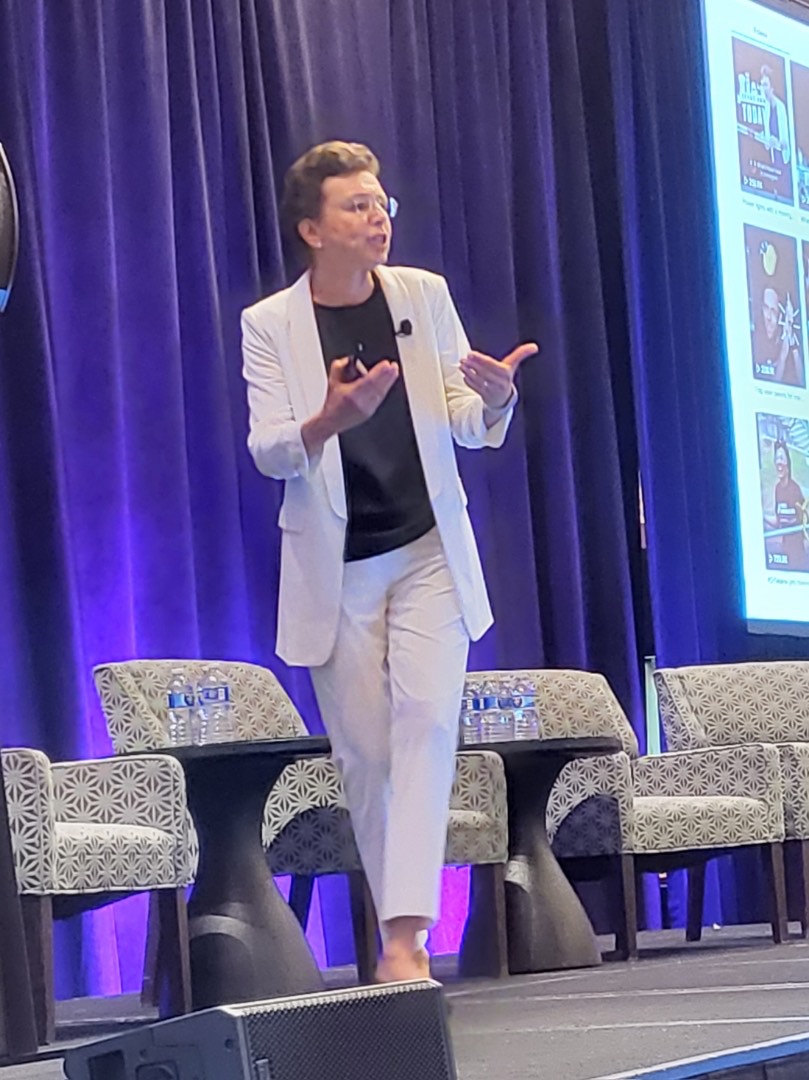 The 2024 David Halliday and Robert Resnick Award for Excellence in Undergraduate Physics Teaching winner is Tatiana Erukhimova, Instructional Professor and inaugural holder of Marsha L. ’69 and Ralph F. Schilling ’68 Endowed Chair in the Department of Physics & Astronomy, Texas A&M University. She received her PhD from the Russian Academy of Sciences in 1999 and joined Texas A&M University in 2001. Her approach to teaching can best be summarized by her 2018 keynote presentation at Texas A&M’s Transformational Teaching and Learning Conference titled: “It’s not business, it’s personal. Teaching large classes, one student at a time.” These words describe Erukhimova’s sincere interest in the individual student and her investment fostering a strong sense of community with her students.
The 2024 David Halliday and Robert Resnick Award for Excellence in Undergraduate Physics Teaching winner is Tatiana Erukhimova, Instructional Professor and inaugural holder of Marsha L. ’69 and Ralph F. Schilling ’68 Endowed Chair in the Department of Physics & Astronomy, Texas A&M University. She received her PhD from the Russian Academy of Sciences in 1999 and joined Texas A&M University in 2001. Her approach to teaching can best be summarized by her 2018 keynote presentation at Texas A&M’s Transformational Teaching and Learning Conference titled: “It’s not business, it’s personal. Teaching large classes, one student at a time.” These words describe Erukhimova’s sincere interest in the individual student and her investment fostering a strong sense of community with her students.
In her talk, “It’s not business, it’s personal. Teaching large classes, one student at a time,“ she discussed her efforts to make introductory physics a meaningful and enjoyable journey rather than a survival experience in weed-out classes. There is no single recipe to achieve that, but she shared some ideas and resources that we have created. Additionally, she discussed several new outreach programs that they introduced with the help of their students. Outreach is not just a service that we provide for the benefit of the public; it is an integral part of the learning experience for the students.
The culture of Erukhimova’s classrooms is one of engaged, communal learning supported by innovative and research-backed pedagogy. She forms a community of mutual support where all students are expected to help each other learn. Her passion for student learning, combined with excellent classroom instruction, has earned her many awards throughout the years, including the Presidential Professor for Teaching Excellence in 2017, University Professor for Undergraduate Teaching Excellence (2021), American Physical Society Fellow (2019), The Nicholson Medal from the American Physical Society (2023), and multiple Association of Former Students awards (a high honor for faculty at Texas A&M).
The 2024 Fellows:
Jennifer Blue, Miami University, Oxford, Ohio
Juan Burciaga, The Colorado College, Colorado Springs, Colorado
Stephanie Chasteen, Independent Consultant, Boulder, Colorado
Brad Conrad, National Institute of Standards and Technology (NIST), Gaithersburg, Maryland
Tatiana Erukhimova, Texas A&M University, College Station, Texas
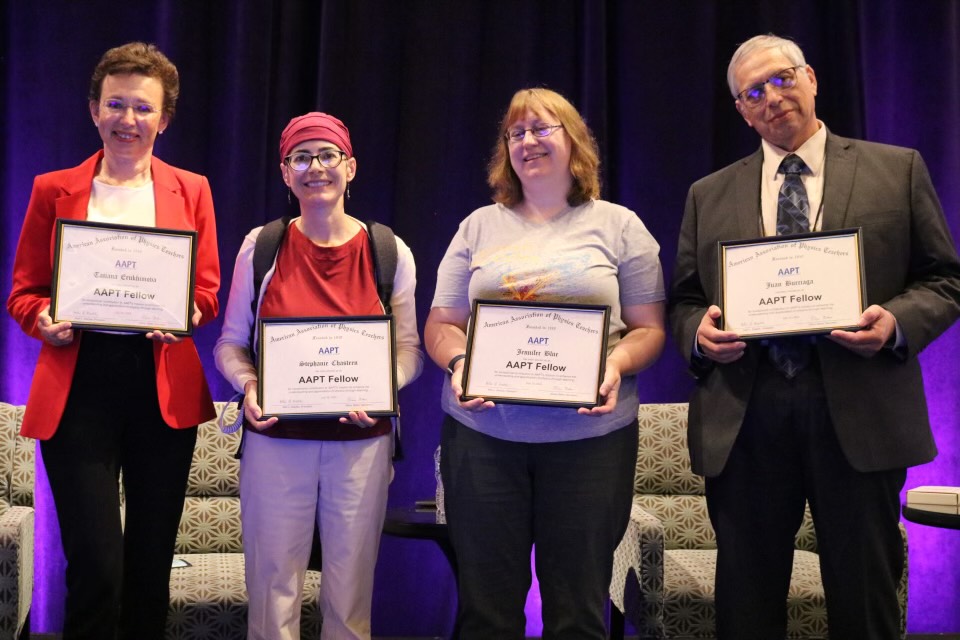
Plenaries
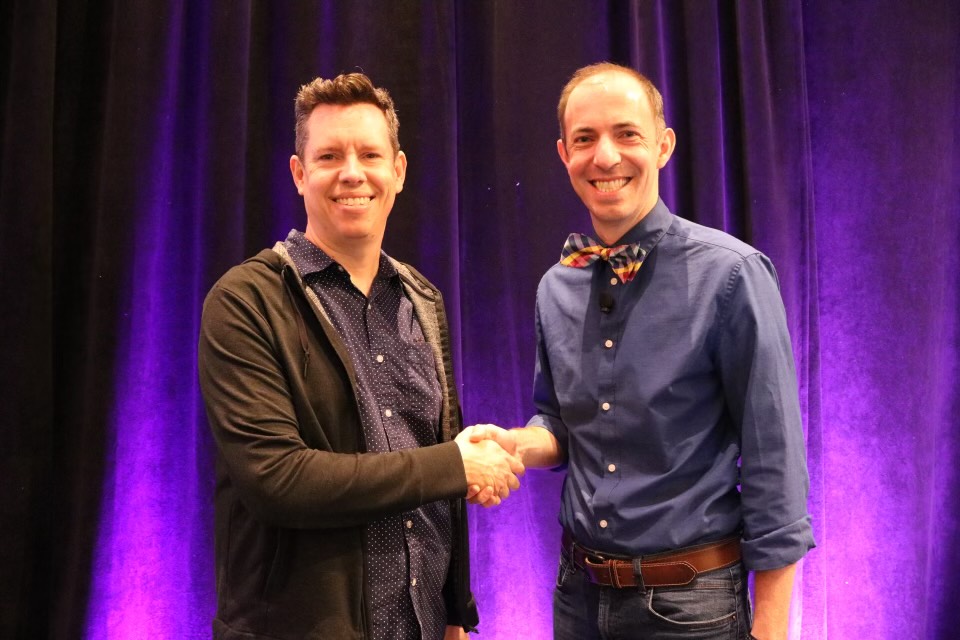 Finding Joy in Teaching Physics: Teacher of the Year, Joe Cossette
Finding Joy in Teaching Physics: Teacher of the Year, Joe Cossette
In a time when we are faced with a significant shortage of physics teachers, it is worth reflecting on the reasons that someone might find joy in pursuing a career in physics education.
Building Educational Communities: STEP UP and PhysTEC Collaboration Abstract: How do we unite educators in communities committed to advancing physics? In 2022, PhysTEC institutions from New York City, Chicago, and Los Angeles partnered with the STEP UP program to increase the number of women and other underrepresented groups pursuing physics degrees. Through a Moore Foundation Grant, these institutions worked to bridge the gap between secondary and post-secondary physics educators. We will discuss efforts made toward community-building, recruiting strategies, and future goals of this collaboration
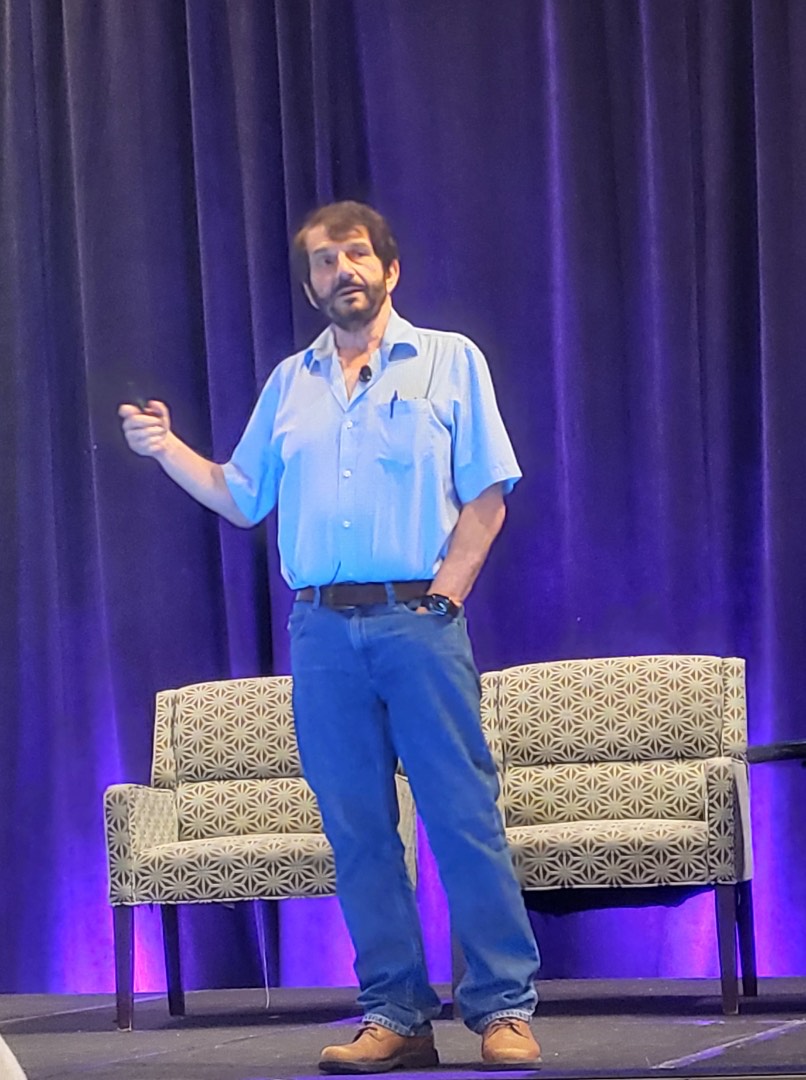 David A. Weitz is Mallinckrodt Professor of Physics and of Applied Physics at Harvard. In his talk, “Have your physics and eat it too: How to teach physics with cooking” Weitz described a course that was developed to teach physics to non-scientists and other reluctant physics learners. It is based on cooking, a popular and necessary pastime for everyone. By sharing the class with world-renowned chefs, students are motivated both to learn physics and to enjoy what they learn.
David A. Weitz is Mallinckrodt Professor of Physics and of Applied Physics at Harvard. In his talk, “Have your physics and eat it too: How to teach physics with cooking” Weitz described a course that was developed to teach physics to non-scientists and other reluctant physics learners. It is based on cooking, a popular and necessary pastime for everyone. By sharing the class with world-renowned chefs, students are motivated both to learn physics and to enjoy what they learn.
Weitz’s group studies the physics of soft condensed matter, materials which are easily deformed by external stresses, electric, magnetic or gravitational fields, or even by thermal fluctuations. These materials typically possess structures which are much larger than atomic or molecular scales; the structure and dynamics at the mesoscopic scales determine macroscopic physical properties. The goal of this research is to probe and understand the relationship between mesoscopic structure and bulk properties. We study both synthetic and biological materials; our interests extend from fundamental physics to technological applications, from basic materials questions to specific biological problems. The techniques we use include video image analysis, light scattering, optical microscopy, rheology, and laser tweezing.
We thank PASCO for sponsoring the Special Event and badge holders, Vernier for their support of the 5K Fun Run Walk and Physics Photo Contest, Harvard, MIT, the New England Section and Boston for a warm welcome.

